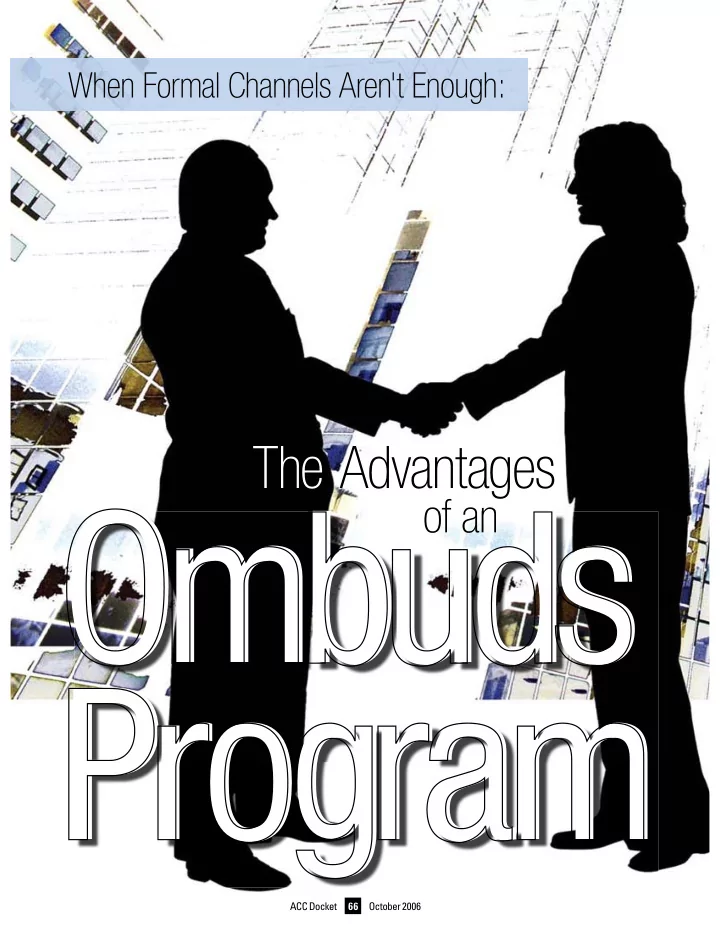

When Formal Channels Aren't Enough: The Advantages of an Ombuds Program ACC Docket 66 October 2006
By Richard Starr, Randy Williams, and Arlene Redmond Alan, an employee in finance, was told to establish a reserve at a level that he considered unsupportable. Josephine, Alan’s supervisor, told him that others were comfortable with it. Alan, however, was still not satisfied that this reserve would fall within accounting guidelines. Unfortunately, he was not comfortable going to Josephine’s boss, given her adamancy that this reserve was appropriate. Nor was he willing to call the audit commit- tee’s hotline; he had doubts about the legitimacy of his concern, and he didn’t want to needlessly jeopardize careers, alienate coworkers, or be seen as a trou- blemaker. He really did not know how to proceed.
Outcome 1: We will outline the role of an ombuds Alan does nothing. However, he was right office and the advantages it can provide while about the reserve level; an SEC investigation offering some tips on how you might set one was launched into possible improper account- up—and how it encourages your employees to ing. The reserve is eventually reversed, and the RICHARD STARR is a give you the advance warning that you need. managing counsel at financials are restated. The company gets sued American Express in New York where he is responsible A Partial Solution: Formal Channels by investors; Josephine is fired. for securities, mergers and Outcome 2: In-house attorneys know that their orga- acquisitions, technology, and intellectual property. Prior to Alan is comfortable going to the ombuds- nizations need an issue management process joining American Express, man (ombuds) because of the program’s that helps the company successfully identify Richard worked as a staff attorney at the Securities and confidentiality, neutrality, and independence. and address potential and actual malfeasance, Exchange Commission and as He knows he could have an informal, off-the- an associate at Paul Weiss unfair treatment, and other unethical behav- Rifkind Wharton & Garrison. record conversation with the ombuds, who is a iors. Thus, over the past several years, organi- seasoned executive and knows the culture and zations have concentrated on formal pro- practices of the company. The ombuds helped grams such as: compliance and ethics, codes him generate and evaluate options for resolv- of conduct, financial controls, and whistle- ing the matter: (1) having the ombuds go to blower and nonretaliation policies, to name RANDY WILLIAMS is a managing director of Josephine’s boss; (2) having the controller or only a sampling. These formal programs take Redmond, Williams & Asso- auditor issue a memo about accounting for re- place via a number of formal channels, such ciates, LLC, a firm that helps clients develop processes serves to all finance employees (either Alan or as legal, compliance, HR, audit, and line for risk mitigation, ethics, the ombuds could have that conversation); (3) asset protection, and gover- management. nance. Previously employed merely refusing to make the entry; or (4) leav- These formal channels have critical issue by American Express for 24 years, Randy served as ing the company (which would not solve the management roles. How else could you de- corporate ombudsperson, root problem). Alan decided to ask the ombuds sign execute programs and policies, promptly leading the global program; center head for operations to have a conversation with the chief auditor, evaluate and formally investigate issues, centers in US and Europe; keeping Alan’s identity confidential. In that escalate issues to appropriate senior leaders, and SVP HR, learning and development and quality. conversation, the ombuds and chief auditor document events, decide outcomes, create brainstormed about if the memo idea should formal reports, and accept legal notice on be pursued or if there were other possibilities. behalf of the company? But formal programs, As a result, the issue was raised to the appro- as important as they are, are simply not priate formal channels and was resolved before enough. Remember Alan from our introduc- ARLENE REDMOND is a managing director of the entry was made and potentially serious tion: What happens when an employee is Redmond, Williams & damage was done to the company. afraid to come forward? Associates, LLC. Previously employed by American Our story about Alan and Josephine illus- Express for 17 years, Arlene Employees’ Reluctance to Report trates the importance of giving your employ- served as ombudsperson and held leadership posi- ees (and your other company stakeholders) Research has shown that even with formal tions in product develop- a safe place to come and informally discuss ment, marketing, quality, ethics and compliance programs, employees are reengineering, and finance. problems. To provide that kind of safe place, sometimes slow to report unethical behavior in For more information, many major corporations have complemented a timely manner or before it becomes more seri- please see www.redmond their formal channels with informal ombuds ous or public, putting at risk the corporation’s williamsassoc.com. programs. Some of these corporations have reputation and/or assets. The Ethics Resource established ombuds programs proactively, to Center’s 2005 National Business and Eth- preserve an ethical environment; others, in ics Survey shows that over the last two years, response to mandates and ethics problems. Corporations although the number of formal programs has significantly with programs include, among others, AllianceBern- increased, so has the percentage of employees who ob- stein, American Express, Bristol-Myers Squibb, Chev- served unethical behavior—from 46 percent to 52 percent. ron, Coca-Cola Company, Coca-Cola Enterprises, Dell, In addition, the percentage of employees observing such Eaton Corporation, General Electric, Halliburton, Mars behavior and not reporting it increased from 35 percent Incorporated, New York Life, Scotia Bank, Shell Oil, The to 45 percent. And we aren’t talking about trivial wrong- Hartford, Putnam Investments, Tyco, and United Tech- doing going unreported. The types of unethical behavior nologies Corporation. observed were significant, and included discrimination, ACC Docket 68 October 2006
Recommend
More recommend